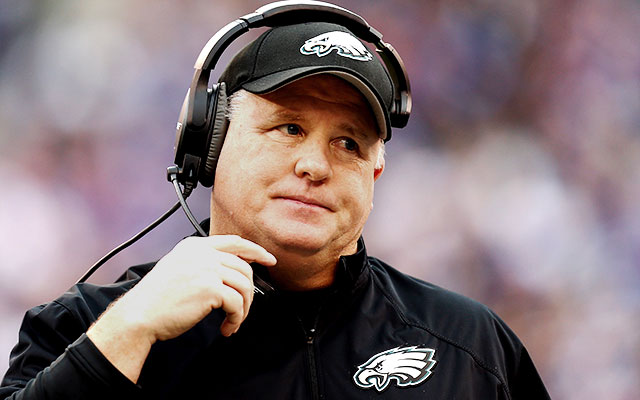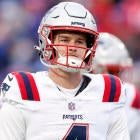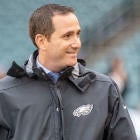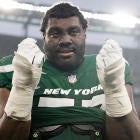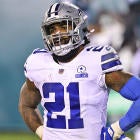A day after the Eagles announced that coach Chip Kelly had been fired less than three seasons into his tenure, team owner Jeffrey Lurie met with the media to discuss the decision.
"It's never an easy decision ... we've done it so rarely -- we've had two coaches in the last 18 years," Lurie said in a brief opening statement on Wednesday afternoon. "It was a clear and important decision that had to be made. And I look forward to watching Chip succeed wherever he goes. But I also look forward to a real improvement to where we're headed ... and I'm also looking forward to the 2016 season.
"I want to publicly thank Chip -- no one work harder the last three years. He's a smart guy ... and I wish him all the success like I did yesterday."
Q: Where did it go wrong with Kelly?
Lurie: "With a coach and any key executive, it's important to really analyze, not to be impatient, not to react to a series of games. ... This was really a three-year evaluation. Where are we headed, what is the trajectory, what is the progress -- or lack thereof -- and what did I anticipate for the foreseeable future, and that's why the decision was made."
Q: A year ago, you spoke enthusiastically about Kelly's vision, scouting, coaching, etc. What changed from then till now?
Lurie: "Last March I said with Chip's vision that he wanted to lead the way to try to go from good to great. I remember saying to all of you, there are dangers in that, having two 10-6 seasons in a row and whether making significant changes you can easily achieve mediocrity. It would be a shame not to try, but the end result was mediocrity. As the owner of the team, I have to look at the progress and the trajectory. It's disappointing to me."
Q: Was there an option to keep Kelly as coach but not as GM?
Lurie: "No, I did not offer that. It was decided that it was best to go in a different direction."
Q Did Kelly make a play to keep his job?
Lurie: "No, he did not. But the atmosphere was such that I think he knew he was being let go. So in fairness, that decision was made before Chip met [with me]."
Q: Why now?
Lurie: "Three reasons. One, I wanted to get a jump-start on our head-coaching search. I knew already what we were going to do and I thought having six extra days was pretty important. ... Secondly, in fairness to Chip, I felt like it was a good way for him to also view the marketplace. Most importantly, however, was the opportunity to spend a lot of time with our players. I've already started that process -- I had a players-only meeting with them this morning. There's going to be more this afternoon. I'm going to meet again with them on Monday. ...
"In today's world, at least the way I like to run things, I want to hear from the players. I want to engage them and have them understand what they felt was lacking ... But also be a sponge for what is leadership like in today's football world ... It's very, very different than what it was 10-15 years ago.
"We're always going to try to be on the progressive end of how to lead and that's top-down. But it's also through the head coach and who the head coach surrounds himself with and it's a real opportunity, and if I waited until Monday (after the season is over and the players are headed home) there would be so much less of that opportunity."
Q: Was Kelly fired because of football, or because of how he interacted with others?
Lurie: "You know, it's one of many factors. So many job responsibilities, and in this case, it was a plethora of variables that had to be looked at and we felt it was best to move on."
Q: Did Kelly lose the locker room?
Lurie: "No, I would not say that ... It's never just one thing when you make a change. It's a combination of so many factors. ... It was more the lack of progress and the trajectory we were going. And a full evaluation of every responsibility a head coach has and a determination how you would predict the next year would go.
Q: Will you hire a general manager?
Lurie: "In terms of reluctance to give a head coach that much control again, we've done it in the past to some degree with Andy Reid, I think the best approach is a real collaborate approach. With Chip, I felt there were good reasons to be bold about what he wanted to do, but going forward a more collaborative approach is the way to go. ... Howie Roseman will remain as executive VP of football operations. Tom Donahoe will run the day-to-day player personnel department, which is a crucial position. Howie will be responsible that our player personnel department is as good as it gets in the NFL and that's the structure."
Did DeMarco Murray have anything to do with your decision?
Lurie: "DeMarco had zero to do with [Chip getting fired] ... I try to get a sense of players and their concerns all year round. There are so many variables that go into it. I go back to peak performance. You have to have tremendous collaboration, trust, agility -- you have to have a lot going for you to have peak performance in leadership."
Q: What was your biggest misstep with Kelly?
Lurie: "It was a bold choice. We knew the potential pitfalls. He was our first choice. It was a unanimous decision we should make that bold choice ... I think whenever you make a bold choice, I hate to be risk-averse. I don't ever want to operate that way, whether it's acquiring a player or picking a head coach. It's much better to go for it than just say, 'OK, well other teams are doing it that way.' One of the things is that, when you make a bold choice, there's increased risk and sometimes it just doesn't work out when you take risks."
Q: Given Kelly's background, why would you give him all that power?
Lurie: "I wanted to make Chip accountable for everything he wanted to have happen. One of the ways to do that was to have him make those decisions. Because that is what he insisted on decisively doing. So if you want to make those decisions, be accountable for them, and that's the direction we took. There was a risk involved in allowing Chip to have that kind of say in player transactions. However, risk-reward. Sometimes the risks don't work. And in this case, it didn't."
Q: Did you have to promise Kelly full control in order to keep him?
Lurie: "There was really no choice in terms of maximizing Chip without him having the lever, so to speak, in terms of making those decisions. That's where it was at. We were either all in or we should find a new coach in terms of trust. The choice was: 'Let's see if this is going to work.' ... The results -- that's why we're here today."
Q: What are you looking for in a new coach?
Lurie: "I think in terms of what we're looking for in a coach, it's several things. No. 1, a smart, strategic thinker. Looking for somebody who interacts every well and communicates clearly with everyone he works with comes in touch with. Understands the passion of our fans and what it's like to coach the Philadelphia Eagles.
"It's a unique and incredibly passionate fan base that just wants to win. You've got to incorporate that into your life and your heart. Another thing is attention to detail. ... Lastly, you've got to open your heart to players and everybody you want to achieve peak performance. i would call it a style of leadership that values information, all the resources that are provided, and at the same time values emotional intelligence. In today's world ... a combination of all those factors create the best chance to succeed.
"In terms of the staff, no one is eliminated ... and yes, it's possible there will be some interviews with members of the staff."
Q: What kind of team will the Eagles be going forward?
Lurie: "It remains to be seen if we run a high-tempo offense -- that depends on the new coach -- but I don't see any players on the roster (Darren Sproles, DeMarco Murray, Vinny Curry, Sam Bradford) that one would say are only a fit for a Chip Kelly team. We have to increase the talent level and increased the performance level of the ones we have. That's the key. It's not a fit-system type of situation.
Q: What type of coach are you considering to replace Kelly?
Lurie: "No category is diminished here. We're going to look at NFL coaches, NFL coordinators, college coaches, retired coaches -- any category you can come up with if we think it's the best candidate. ... We're looking for the best leader ... I don't think there's any clear evidence of offense over defense. It comes down to the leadership ability of today's athlete in today's world. I don't treat offense or defense differently.
